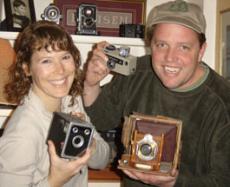By: Kristen Tomaiolo
Posted In: Entertainment

Photo credit: Kristen Tomaiolo
Andrea Hansen, owner of Hansen Photography in Newport poses with husband, Dave Hansen, photographer for The Newport Daily News.
NEWPORT, R.I. – Mustard-colored doors open the way to Studio 1: Photography and Printmaking. Inside, a large printmaking press stands still while the hum of a computer printer echos throughout the room. Manuals for Adobe Illustrator, QuarkXPress, and other computer programs line the shelves above Daniel McManus, photography instructor at the Newport Art Museum.
McManus uses Adobe Photoshop to manipulate pictures he downloaded from his digital camera. Black-and-white photos of children smile back at him from the computer screen as he waits patiently for the old Epson printer to finish its job. According to McManus, an amateur photographer does not need these fancy programs and equipment. A person should just think about taking pictures. “Don’t get caught up in this equipment,” McManus said. “The camera is a tool and how best can you use it with your creativity.” That’s something to remember if you’re in the market for a new digital camera. If you are ready to buy a digital camera, whether it’s your first or fourth, it can be an overwhelming and confusing venture. According to Designtechnica, a company specializing in technological advancements, more than 50 percent of American households will own a digital camera by the end of 2006. Each of them will be on the hunt for the ‘right’ camera. Local camera experts and digital photographers offer the following tips for a successful hunt for the perfect camera: Do your homework: Arriving at a store, the typical buyer finds an overwhelming array of digital cameras with a variety of features and price tags. To avoid overload, Andrea Hansen, owner of Hansen Photography in Newport, thinks a buyer should go online and look through photography magazines for consumer reports before going to the store. “Arm yourself with knowledge,” Hansen said. “It never hurts to know as much as you can about something you’re going purchase.” For Hansen, many stores have uninformed employees which poses as a problem. Coming to the defense of camera store employees is Hansen’s husband, Dave Hansen, photographer for the Newport Daily News. “There is a lot to learn,” Hansen said. “One day they are working in TVs and the next day they are working in this, you can’t expect a person to know everything.” Hansen suggests going to DigitalPhotographyreview.com where every feature on a camera is tested. People can view lists and choose the features they want. Like the Hansens, Jason Green, manager of Ritz Camera in Newport, thinks a person should research, but should play with some cameras first. Tests and reviews cannot tell a person everything according to Green. “Ultimately, it comes down to what feels good in your hands,” Green said. “If it’s not comfortable when you’re holding it, you’re not going to want to take pictures. Know your needs: Think about what you plan to do with your camera, and if you don’t need a feature, don’t buy it. Andrea Hansen advises amateurs to stick with compact cameras-small cameras will lower price tags that allow budding photographers to simply point and shoot. These cameras can be slipped into a pocket and brought along nearly everywhere ranging in price from $100 to $500. Since these cameras automatically calculate light and focal point, users simply need to click and get a great picture. Some patience could be required as well. As Hansen points out, compact cameras have a few second delay between the time the photographer shoots and the camera completes the picture. Hansen cautions that the ‘perfect’ moment could be lost. Pay attention to the megapixels and memory cards on compact cameras. The greater number of megapixels (MP) the better image quality. The memory card, which stores the pictures, is measured in megabytes (MB). However, higher numbers bring higher price tags. Hansen suggests a 4MP compact camera with a 256 MB memory card which will produce a higher quality image and hold around 100 images for an amateur photographer. This camera will cost around $200. All these features can drain batteries, so experts advise buying a camera that takes rechargeable and disposable AA batteries. This capability can be helpful if the rechargeable batteries die and waiting for the charge is not an option. However, disposable AA batteries result in frequent runs to the store, according to McManus. “If your in the middle of the desert…they will probably have AA batteries”, McManus said, “You might pay a lot of money for those AA batteries, but they will have them.” Stick with name brands: It may sound clich













